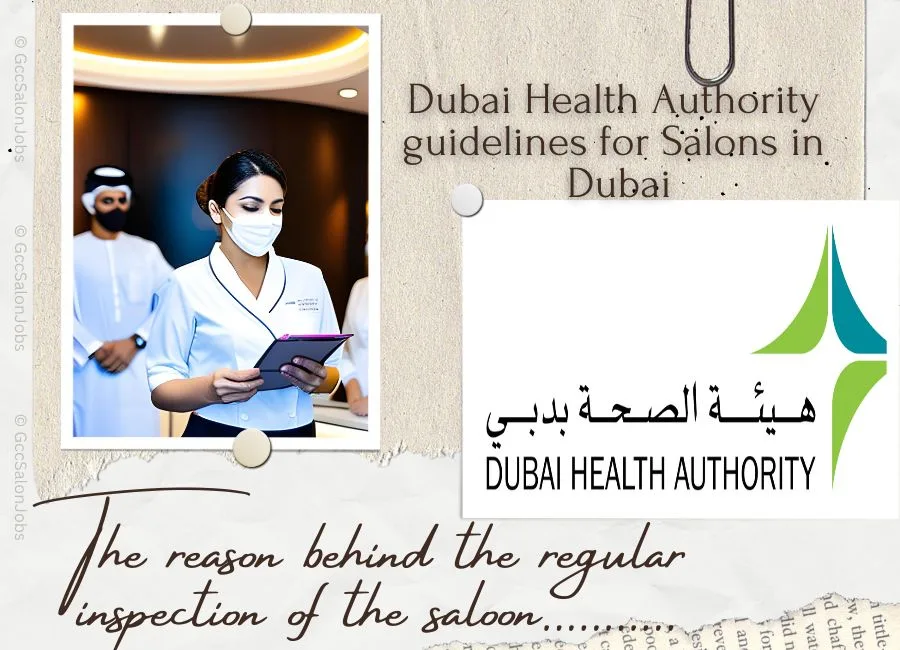We have heard from many immigrants works (from Nepal, India, and the Philippines) who once worked in the salon; saying, “I was deported by the company and I had to pay the fine in UAE”. Also, we can hear chats of some salon owners that they had a very bad day as they had to pay fines for DHA inspection the very reason behind these problems is that they do not follow DHA guidelines. If you do not want to pay fines then you ought to follow the DHA guidelines or you may be convected to pay fines or permanent termination of your business license.
The Dubai Municipality guidelines for the sterilization process of salon tools to ensure proper hygiene and infection control. The following are the recommended steps for sterilizing salon tools according to the Dubai Municipality:
- Cleanliness: The municipality may check the cleanliness of the salon, including floors, walls, equipment, and surfaces. The salon should be free from dust, debris, and visible signs of dirt or grime.
- Hand hygiene: The municipality may check that the salon staff are practising proper hand hygiene, including washing their hands frequently and using hand sanitisers between clients.
- Personal protective equipment (PPE): The municipality may check that the salon staff are wearing appropriate PPE, such as gloves and masks, to prevent the spread of infectious diseases.
- Disinfecting: Immerse the tool in a solution of 70% isopropyl alcohol or an EPA-registered disinfectant solution for the recommended time. Ensure that the tool is fully submerged and that the solution covers all surfaces. Follow the manufacturer’s instructions for the correct dilution and contact time.
- Sterilizing: Depending on the type of tool, it may need to be sterilized using heat or chemical sterilization. Follow the manufacturer’s instructions for the appropriate sterilization method. For heat sterilization, the tool should be wrapped in a sterilization pouch and placed in an autoclave for the recommended time. For chemical sterilization, the tool should be immersed in a sterilizing solution for the recommended time.
- Storage of chemicals: The municipality may check that chemicals, such as disinfectants and cleaning agents, are stored properly and labelled correctly to prevent accidental exposure.
- Waste management: The municipality may check that the salon is disposing of waste properly and that sharps, such as needles and blades, are being disposed of in puncture-resistant containers.
It is important to regularly monitor the effectiveness of the sterilization process by using appropriate testing methods to ensure that all microorganisms have been eliminated from the tools. Additionally, it is recommended to perform regular maintenance of the sterilization equipment to ensure that it is functioning properly.
Dubai Municipality Law No. 11 of 2003: This law regulates public health and safety in Dubai and provides for fines and penalties for non-compliance. Failure to comply with sterilization guidelines for salon tools can result in fines of up to AED 5,000.
On Oct 02, 2013, Mohammed N Al Khan writes on The National News that 245 Dubai salons were fined for health and safety violations in Dubai and Dubai collected Dh182,500 from the fine on that precise inspection. Likewise, on 14 May 2019, Ismail Sebugwaawo publishes a news article in the Khaleej Times Dh5,000 fine warning for Abu Dhabi salons, and beauty parlours. The list goes on and on so if you are in the salon and beauty industry now is the time to be serious about DHA guidelines or you will be the next in line to pay the fine bills.
The major department that inspects the salon frequently is Dubai, UAE.
Dubai Municipality Public Health and Safety Department: This department is responsible for monitoring and enforcing compliance with health and safety regulations in Dubai. Inspections of salons are carried out regularly, and non-compliance can result in fines, penalties, and legal action.
Dubai Municipality Infectious Diseases Regulation: This regulation requires that all tools and equipment used in salons be properly sterilized to prevent the spread of infectious diseases. Failure to comply can result in fines and penalties.
The reason behind the regular inspection of the saloon by DHA; is that salons can be a potential source of transmission for various infectious diseases. The following are some of the types of diseases that can be transmitted through salon services:
- Human immunodeficiency virus (HIV): HIV can be transmitted through the sharing of contaminated needles, razors, or other tools that pierce the skin, such as earrings or body piercing equipment.
- Hepatitis B and C: These viruses can be transmitted through exposure to infected blood and bodily fluids, including during tattooing, piercing, or hair removal services.
- Fungal infections: Fungal infections, such as ringworm, can be transmitted through the sharing of combs, brushes, and other tools that come in contact with the skin or scalp.
- Bacterial infections: Bacterial infections, such as impetigo or cellulitis, can be transmitted through the sharing of contaminated tools, such as razors or scissors.
- Skin infections: Skin infections, such as MRSA, can be transmitted through contact with contaminated surfaces, such as chairs, towels, or other equipment.
The above given transmitted disease list might not be complete I just try to highlight the common ones but if you have more lists please write them down in the comments <3. It is important to note that the risk of transmission can be minimized through proper hygiene and infection control practices, such as proper sterilization of tools, use of disposable tools where appropriate, and proper hand hygiene by staff and customers. Salon owners and operators should also follow the guidelines established by the Dubai Municipality to ensure that their salons are maintaining proper hygiene and infection control practices.

